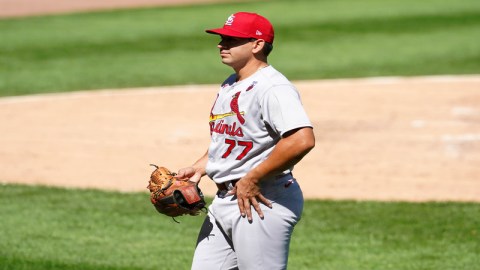All Tuesday long, NESN.com will take a look at five potential NFL rule changes that are being discussed at this week's owners meetings. Let's kick things off with one of the league's most debatable topics: overtime.
The push for a rule change gained steam once again during the 2009 regular season, but the outcry really heated up after the Saints scored on their opening possession of overtime to beat the Vikings in the NFC championship game.
Overtime Facts
From 1974-2009, 445 regular-season games went to overtime, and the team that won the coin toss won the game 240 times (53.9 percent). The team that lost the toss won 188 times (42.2 percent), and there were 17 ties (3.8 percent).
Of those 445 games, each team had at least one possession 310 times (69.7 percent), and the team that won the toss drove for the winning score on its first possession 135 times (30.3 percent). Of those 135 scores, 100 came on field goals.
Also, 312 of the 445 games (70.1 percent) were decided by a field goal, 114 ended with a touchdown (25.6 percent) and two ended with a safety (0.45 percent).
Since 1994, when kickoffs were moved from the 35-yard line to the 30-yard line — to increase scoring — there have been 244 regular-season overtime games, and the team that won the toss won 146 of those games (59.8 percent). Of those 244 games, each team had at least one possession 160 times (65.6 percent), and the team that won the toss drove for the winning score 84 times (34.4 percent). There were 64 touchdowns and 20 field goals on those 84 possessions.
And finally, 27 playoff games have gone to overtime since 1958, and each team had at least one possession in 22 of those games (81.5 percent).
Current Rule
There is a 15-minute sudden-death overtime session, and the first team that scores wins the game. In the regular season, if the 15 minutes expire, the game ends in a tie. In the playoffs, if time expires, a second sudden-death overtime begins.
Proposed Rule
This proposition has had some variations, but this appears to be the common target — and since the wording can be complicated, let's use two teams as an example:
If the Patriots receive the opening kickoff in overtime and score a touchdown, they win. If they kick a field goal, they'll kick off to the Jets, who can win the game with a touchdown. If the Jets also kick a field goal, they kick off to the Patriots, and the next team to score wins. If the Jets fail to score on their initial possession, the Patriots win. If the Patriots fail to score on their initial possession, the Jets can win the game with any score.
Will it Pass?
Twenty-four of the league's 32 owners will need to approve this rule for it to pass. While it's almost universally acknowledged that the NFL's overtime system is flawed, this proposed change is certainly not without its own flaws. Most of all, it's a little complicated and might be a little too modernized for more traditional-thinking owners. While it's annoying for teams to lose a coin toss and subsequently lose the game, opponents of the rule will point out that it only happens once out of every three overtimes.
The NFL overtime will eventually face some real tweaking, but this option might have a really difficult time passing.
Better Options
Take this proposed change and make it simpler. Say, the first team to score seven (or eight) points wins the game. Forget the obscure rules about answering possessions because those rules will cause some headaches.
Or, play an eight- or 10-minute overtime session, and the team with the most points at the end wins.



